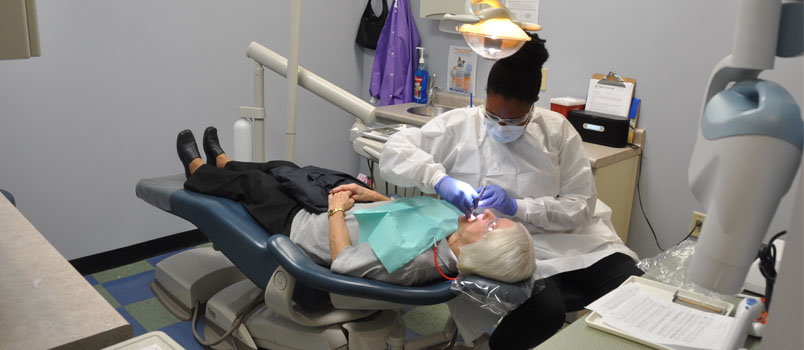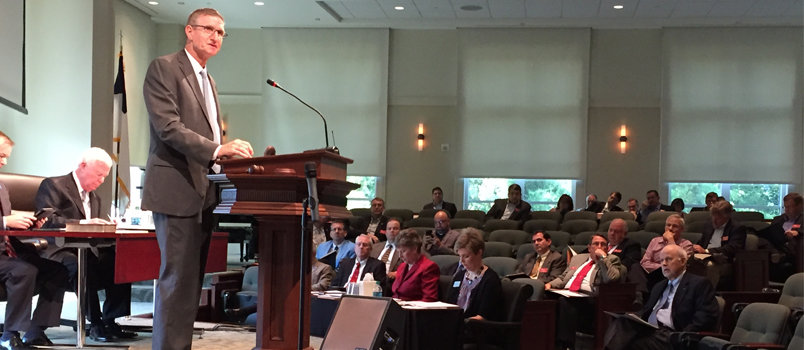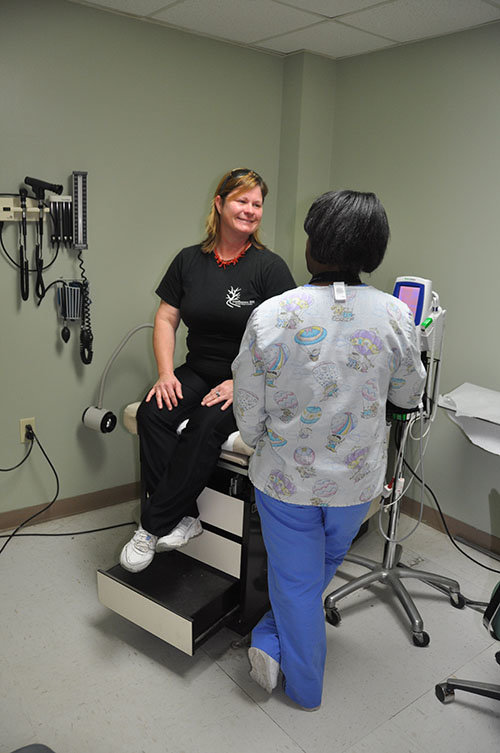 In this file photo, the J.C. Lewis Center benefited from a $100,000 grant from the Georgia Baptist Health Care Ministry Foundation in 2013. The grant helped provide medical services to under- and non-insured Savannah-area residents. JOE WESTBURY/Index
In this file photo, the J.C. Lewis Center benefited from a $100,000 grant from the Georgia Baptist Health Care Ministry Foundation in 2013. The grant helped provide medical services to under- and non-insured Savannah-area residents. JOE WESTBURY/IndexThis is the final of a dozen stories highlighting the upcoming annual meeting of the Georgia Baptist Convention in Savannah. The stories, which have been published on Monday, Wednesday, and Friday for the next four weeks, have included both Convention-related content and a look at how the Savannah Baptist Association is making a Kingdom impact in Coastal Georgia. The annual meeting opens Monday afternoon at Calvary Baptist Temple and concludes on Tuesday night.
SAVANNAH — On a typical Monday morning in downtown Savannah, a stone’s throw from its namesake river, a sprawling one-story building serves as a magnet for individuals seeking health care.
Cars idle in the street waiting for a parking spot in the small lot behind the chain link fence. Some drivers double-park in order to get inside take a seat in the waiting room while others walk to the clinic to receive assistance for what ails them.
For 18 years the J.C. Lewis Primary Health Care Center has been struggling to meet needs of residents of Savannah and Chatham County, restoring health to some while teaching others to manage chronic illnesses. While the needs are great, the funding remains a constant priority for those who oversee the healing arts.
 The never-ending need for assistance from entities like the Georgia Baptist Health Care Ministry Foundation is obvious.
The never-ending need for assistance from entities like the Georgia Baptist Health Care Ministry Foundation is obvious.
The center began in 1999 focusing on homeless shelter clinics and expanded into the general community in 2009. Three years later its caseload reached 7,700 clients resulting in about 25,000 medical visits; in 2013 they served 8,009 with 28,053 visits.
The entity grows at a yearly increase of about 600 clients and more than 3,000 medical visits. The needs constantly outpace the funding ability.
“Clients receive medical as well as dental services at the clinic but the greatest need is education and preventative care to avoid repeat crises,” a spokesperson noted.
Individuals receive assistance in managing chronic diseases such as diabetes, hypertension, and smoking cessation as well as health concerns linked to poor lifestyle choices resulting in obesity, substance abuse, and poor mental health. Much of those concerns could be avoided through education and developing better lifestyle habits.
Through a six-day, 52-hour-week schedule a team of physicians, a psychiatrist, dentist, dental hygienist, and licensed professional counselor offer a variety of approaches to healing. They are supported by a team of more than 40 staff members.
 Will Bacon, president and chief financial officer of the Georgia Baptist Health Care Ministry Foundation, recently shared ways the Foundation is changing lives for eternity. Bacon spoke at a meeting of the Executive Committee of the Georgia Baptist Mission Board in suburban Atlanta. JOE WESTBURY/Index
Will Bacon, president and chief financial officer of the Georgia Baptist Health Care Ministry Foundation, recently shared ways the Foundation is changing lives for eternity. Bacon spoke at a meeting of the Executive Committee of the Georgia Baptist Mission Board in suburban Atlanta. JOE WESTBURY/IndexIndividuals like Elizabeth Harris is grateful to funding agencies like the Georgia Baptist Health Care Ministry Foundation for helping restore her health.
“I’m a stroke victim without any insurance. The folks here have been very gracious and understanding of my condition. Without their help I don’t know what I would do. This means everything in the world to me,” she says as she begins a checkup visit.
The clinic is popular because of the chronic lack of insurance among many individuals in society today. Some small businesses are not able to afford the benefit to employees and others working on minimum wage cannot afford the high premiums.
And that’s where Georgia Baptists come into the equation. Buddy Wasson, association missionary of Savannah Baptist Association, says the partnership between the Association and the clinic is a visible way of showing the love of Christ to those outside the walls of the church.
 In this file photo, stroke victim Elizabeth Harris is grateful for grants such as those provided by the Georgia Baptist Health Care Ministry Foundation. Without such assistance Harris, who has no insurance, would be struggling to receive medical attention. JOE WESTBURY/Index
In this file photo, stroke victim Elizabeth Harris is grateful for grants such as those provided by the Georgia Baptist Health Care Ministry Foundation. Without such assistance Harris, who has no insurance, would be struggling to receive medical attention. JOE WESTBURY/IndexThe association has been sensitive to needs of lower income residents on its mission field. For years it has supported the Savannah Baptist Center, meeting the physical, emotional, and spiritual needs of persons in East Downtown. The center is based out of its 704 Wheaton St. headquarters.
Its partnership with the Lewis Center extends that into the medical and psychological realm. In addition, it provides assistance to homeless through the Association’s Oasis Ministry, which was funded through a $100,000 grant from the Georgia Baptist Health Care Ministry Foundation. And importantly, it provides spiritual counseling as requested through the volunteer ministry of Dane Moore of Sycamore Church.
Wasson sees its relationship with the Lewis Center as normal extension of its Christian presence in the city.
“We as a people no longer live on ‘church fields,’ we live on mission fields. The Church needs to start thinking like missionaries and living like missionaries,’ he says.
“The Health Care Ministry Foundation is helping us fulfill that mission of getting outside the four walls of the church and becoming more visible in our community. The Foundation summed it up best when it coined the idea of being a ‘hospital without walls;’ they are moving health care out of the traditional framework and moving it into the communities where it is needed the most. In like manner, we as the Church are being empowered to follow the same ministry model.”